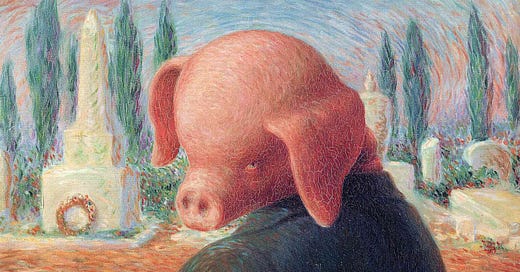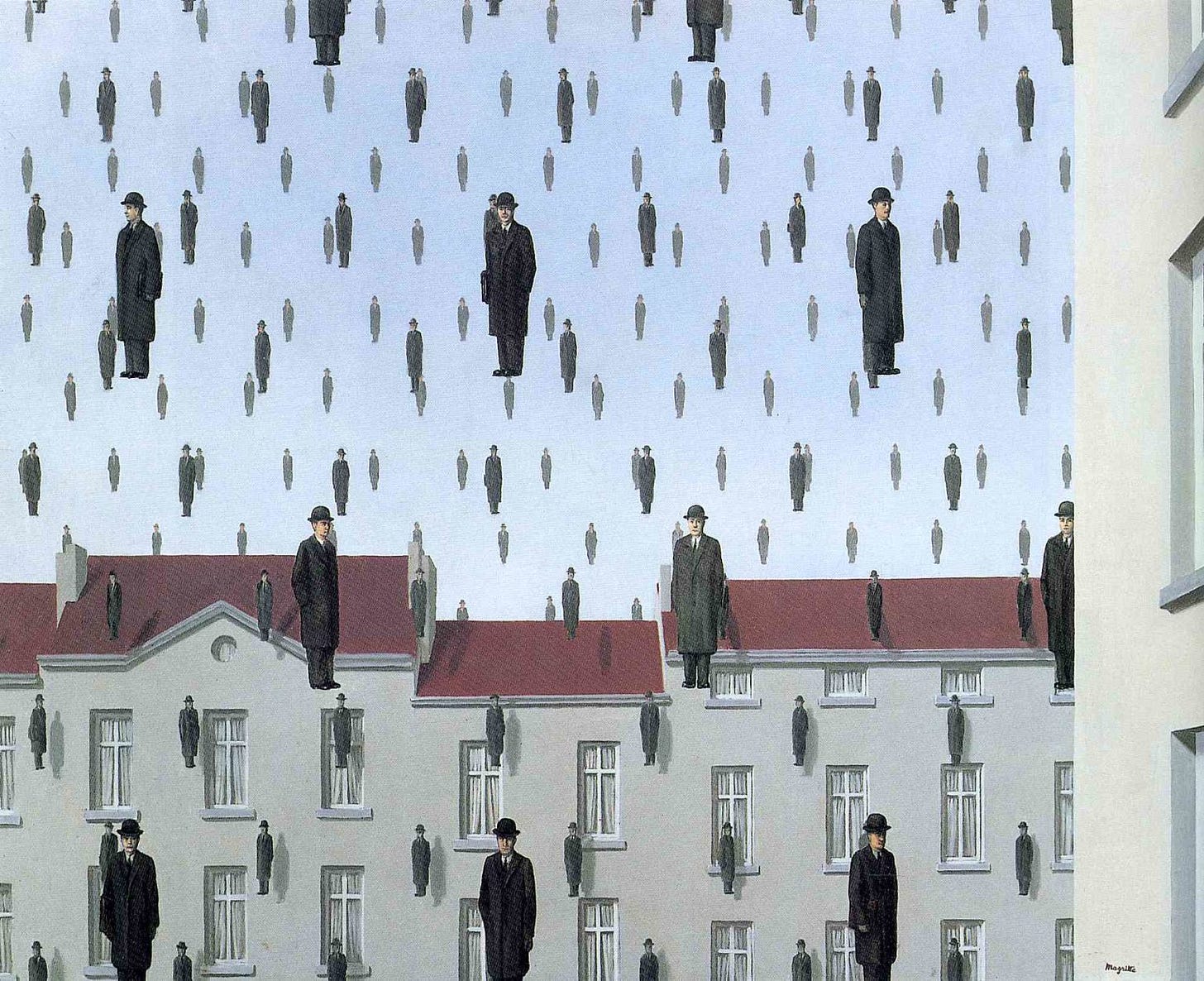A smaller entry this week for our shortest chapter yet.
That lacerated, macerated feeling
Another. But what other? What other had I within me, save this torment, which revealed me to myself as none and a hundred-thousand?
We left Moscarda alone, his wife having fled the scene after being manhandled by him. And that is where we find him again: utterly and completely alone.
The emotions Moscarda goes through after the accident are a perfect example of how complex and contradicting the human mind can be, and Pirandello navigates them expertly. Here he is, writing about the impossibility to understand another human being, all the while doing his utmost to make us understand. We can never truly experience empathy, he says. Please try anyway, he says.
The first emotion Moscarda feels is euphoria. He gave in to his anger, grabbed Dida, shook her, and it felt right. After days and days of identity crisis, abandoning himself to instinct suddenly made him feel real again—he went from no one to someone. In that moment he didn't wear a mask, he didn't censor his actions or dance around the issue, he was true to his feelings. It was freeing, exhilarating. It turned him into a beast.
If only it were that simple, right? Man can't ever undo evolution and become an animal again. What inevitably follows is horror for his own actions and then, regret. He hurt Dida, whom he loves despite all. Convinced as he was that he never had her in the first place, that she loved another through his body. Losing Dida for good is excruciating.
Freedom, joy, empowerment. Horror, regret, despair. They all can live inside us at the same time.
Moscarda's emotions finally settle on emptiness.
I was alone. In all the world, I was alone. For myself, I was alone. And in the instantaneous shudder which now shot up to the roots of my hair, I knew eternity and all the frigidity of that infinite solitude.
Everything is futile. He will find himself alone no matter if Dida leaves or stays. She won't ever know him, like nobody else will. And what's worse, he won't ever know himself. He has no idea who he is, he cannot predict what the mess that is the human mind will do next. His identity is in flux. He is floating in a cold void.
Alone.
Producing Moscardas
And I must have been mad, indeed, to expect a doll-like thing such as she to go mad along with me like this, for no reason at all.
We have met Gengé the puppet, willingly exploited by family and friends. We’ve met Dida the porcelain doll. Now meet Moscarda’s father-in-law, a perfectly poised wax figure. All masks, all artificial, all lives crystallized into unnatural forms. Moscarda has killed the puppet and broken the doll. Now his disruptive actions have turned a wax statue into a disheveled and rather angry man.
Moscarda’s night, full of horror and existential dread, brought him to the decision to do whatever he can—even go back to university and get a job—if it means winning Dida back. Despite knowing that she won’t ever truly be his and that whichever career he chooses will only mean another mask to wear, the alternative, the utter loneliness of the Void, scares him too much.
But because man is unpredictable, the light of day and the visit from Dida’s father swiftly turn dread into mirthful madness, and the horror once again turns to farce. Why cry, why despair, when nothing matters? His father-in-law’s anger wakes Moscarda’s rebellious side and he proceeds to invent more and more alter egos to annoy him—what would Dida prefer, Gengé the lawyer, Gengé the doctor of the philosophy professor?
There is an earnestness to Moscarda, a naive plea to be loved and understood destined to go forever unfulfilled. His plan to win Dida back is hopeless just like his plan to fix his reputation among townspeople. All they will see is the “Madman! Madman! Madman!” who threatened to bankrupt his father’s bank for for no reason at all, and ruined his life in the process.
Yet more paradoxes. Moscarda doesn’t know who he is anymore, sees his identity in flux; but his identity is also set in stone, he is the “good lad but wild” that all town knows. Not even going mad will liberate him from it.
Get ready for a lengthy and eventful conclusion next week, followed by a brief epilogue. Thank you all for sticking around!







The artwork has been marvelous on journey. Perfect.
Moscarda seems to be getting out of his ‘head’ and into his feelings more. Maybe this is his psyche trying desperately to reconnect with his physical body - when you’re angry your body gets involved - pounding heart, Adrenalin, blood pressure etc. First with the poor dog and then with his defenceless wife he has lashed out in anger. I read that there is research that indicates that men and women perceive and express anger differently. While women see loss of temper as a loss of control, men see it as a way of asserting control over others. And I think that is what M is trying to do perhaps - reintegrate with his body and control the thoughts and behaviours of those around him. I think his wife should stay at her dad’s!